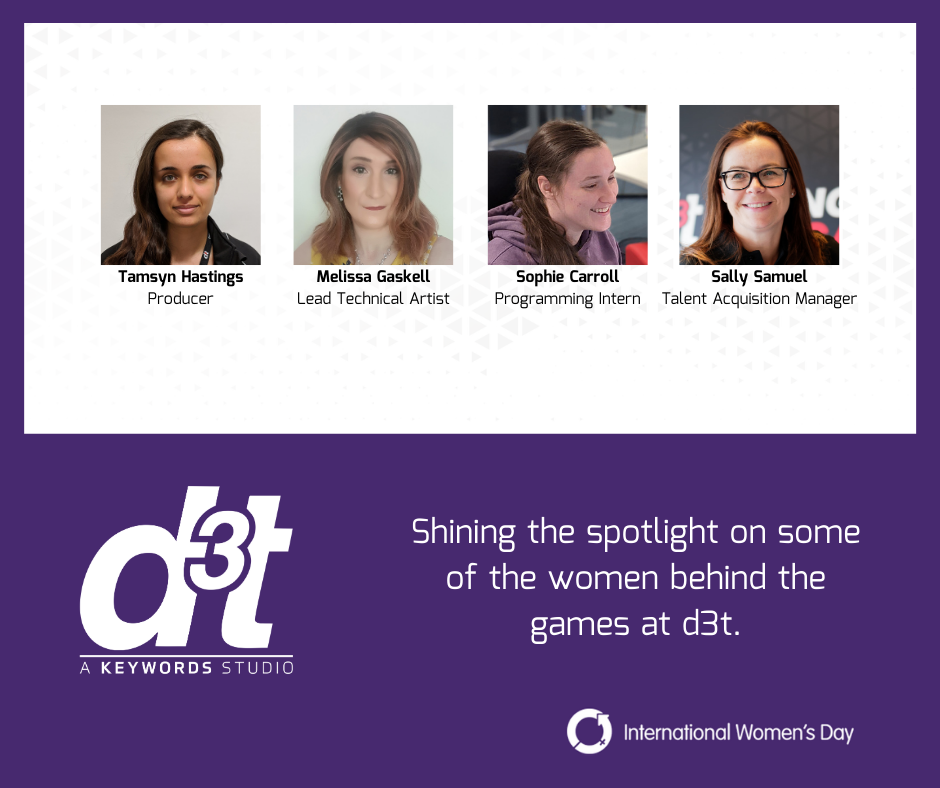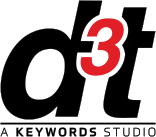International Women’s Day 2021
8th Mar 2021
Encouraging more women in games is important to us, and our experience has demonstrated to us that a more diverse workforce leads to a more creative and vibrant team culture. d3t hired women into a variety of key roles in 2020 across the Programming, Art, Production and Operations teams and are continuing to do so in 2021. We remain laser-focused on broadening the diversity profile of the team at every opportunity.
So, as we celebrate International Women’s Day 2021 and look towards our spring student engagement activities and share tips and advice through our monthly spotlight features that ‘you CAN work in games’, we want to turn the spotlight on some of the women at d3t who have helped us get to where we are today.
We caught up with Tamsyn from production, Melissa from tech art, Sophie from programming and Sally from our operations teams.

What do you do day-to-day at d3t?
Tamsyn: During this pandemic period, I’m generally up early catching up on the day before, seeing if anything has come in overnight from clients or co-workers and making sure that reports and meeting prep are ready to go for the day. Otherwise, my day-to-day depends on the day itself. I can always trust Mondays to be full of meetings and Wednesdays being a good opportunity to be able to catch up on anything that’s on the backlog.
Melissa: I’m a Lead Technical Artist here at d3t so day-to-day my time is spent managing the other Technical Artists. I’m also working full-time on a project so my main tasks have been integrating & updating pipeline tools for artists in Maya & 3DS Max to enable them to carry out their work effectively, writing tools in Python for parsing data and returning information regarding that data for analysis and spotting errors in the data set. I’ve also been involved in assisting the programming team writing an animation pipeline from the ground up to get animations from Maya into the game engine, this has also included a blend shape pipeline for character facial animations.
Sophie: It’s difficult to define day-to-day life as a games programmer. Every day can be completely different from the last and I think that’s what makes the job so interesting. One day I could be bug fixing and the next I could be working on engineering a new feature or mechanic to the project. I could spend days trying to work my way through a problem or I could solve several in a single day. You never really know what the next day will bring. As an intern, I’ve also been lucky enough to be somewhat of a generalist during my time here at d3t. At one point I was working on an in-house smoke-testing tool and now I’m working on a AAA game for one of our clients. Being exposed to such different projects means in such a short time I’ve gained experience in many different areas (UI, Inputs, Gameplay, Networking, etc.) and even worked in several languages (C++, C#, Lua, Visual Scripting). So, it really is a very diverse role.
Sally: Working alongside the Operations Team, I look after all the hiring for d3t’s studio covering Programming, Art, Design, QA, Production and Operational roles. My role is really varied which I love and can include: sourcing talent for the studio and its various projects, arranging interviews and job offers, attending university, industry and career events, promoting the studio’s great culture and d3t team plus onboarding and inducting new hires.
Is there a specific part of your job that you enjoy the most?
Tamsyn: Learning about the different areas of game dev. How you go from a couple of grey box levels and assets with a storyboard stuck to a wall to a fully working and released level and/or game. Being able to know how the different departments work and how you can put everything together is really interesting. Other than that, I’ve always enjoyed dealing with clients and learning about business development.
Melissa: I enjoy all aspects of my job, but mostly it’s the problem-solving aspect I find the most enjoyable. Every project is different and has its own different set of challenges and problems to overcome, and to reach an end goal and see what you’ve created is really quite rewarding.
Sophie: It might sound strange considering I work alongside many talented artists, but I really enjoy the creativity that my job affords me. I find that people outside the world of programming often don’t realise how creative software engineering can be at times – and that goes double for game development. A big part of the role is coming up with imaginative and hopefully innovative solutions to overcome the hurdles that each individual application will present to you. Games are a collection of many different parts intertwining and working together to try and produce a unique experience for the player. So, no two games are the same and as a developer that can often mean facing new challenges that are entirely unique to that one game. Then once you have you have found your solution, the rewarding feeling of seeing all your hard work pay off on screen is what makes the job special.
Sally: I thoroughly enjoy the people aspect of my role, as I’ve always found talking to lots of different people about their careers and lives really interesting. It’s especially great when individuals join us and you see them settle into a job they really enjoy and develop within their role and the company. It always gives me a huge sense of satisfaction and involvement to feel part of someone’s journey in the workplace.
What does International Women’s Day mean for you?
Tamsyn: I appreciate that it gives women the opportunity to be able to have a day where they can build, or be invited to, an environment where they can discuss topics and celebrate their achievements; supported by others within and outside of their profession and passions.
Melissa: Being a transgender female, International Women’s Day means a lot to me. Having recently come out as transgender last year and to be accepted by everyone as my true gender was just the most incredible feeling and it’s a day for all women to come together to celebrate.
Sophie: I think International Women’s Day is a great time to reflect on all the progress that has been made on allowing women to have more opportunities in roles that were historically very male-dominated. We are very lucky at d3t to work alongside so many talented women across all disciplines and it’s great to see that continue and improve, as over time more and more women are taking on positions here at the company.
Sally: It’s a really important day as it’s a globally recognised day, in which women get to share not only their own but other women’s success and stories, whilst raising awareness for a wide range of women’s issues in need of support. In an industry that is generally underrepresented by women, it’s great to hear about others joining the industry, doing well and sharing ideas.
Any words of advice for women who might not have ever considered a career in games?
Tamsyn: If you have an interest in games and want to work in the industry, get your foot in the door. Don’t undersell yourself or take a position that you aren’t wholly interested in and be aware of what the differences would be in company culture between an indie developer or a larger studio. Know what you’re looking for in your career, what sort of games you want to work on and then look around for job opportunities. The right position will come around.
Melissa: The video game industry is incredibly diverse and has lots of opportunities for anyone, especially women who have never considered a career in games. It’s not just about programming, there are so many more aspects from quality assurance or artwork, right through to project management and human resources. So if video games is something that piques your interest, you should certainly take a look. After 20 years in the industry, I’m still hooked!
Sophie: The brilliant thing about the industry is that even if you’re not a technical person there are still an abundance of roles available across many different teams. However, for those programmers out there that may be working in other industries, I’d suggest making games in your spare time and learning C++ if you don’t already have that under your belt. Programming skills from other industries are very transferable so if you take the time to learn some of the more game-specific elements of the job, then you’ll have a much easier time adapting to the nuances of the game development. The industry has come under scrutiny the past few years, but don’t be put off by that. I promise that there are a lot of companies out there, like d3t, that respect their workers and put strategies in place to reflect that – such as the anti-crunch ethos we have here.
Sally: If you think you might be interested in a career in games or would just like to know more, I would suggest contacting and starting to network with other women in the industry – LinkedIn is a great place for this. It’s an open and friendly industry, so I’m sure you would get some great advice and guidance. Women in Games is also a great organisation to get involved with.
Looking to d3t’s future, we will be striving to encourage those who have never considered a career in games to think again. d3t takes prides in its inclusive and nurturing culture which sets us apart from many in the games community. This along with a professional yet friendly environment means d3t is attractive to many entering the industry for the first time, as well as those with existing industry experience.
If you want to join our growing and inclusive company, why not take a look at our vacancies? Maybe we’ll see you soon!

